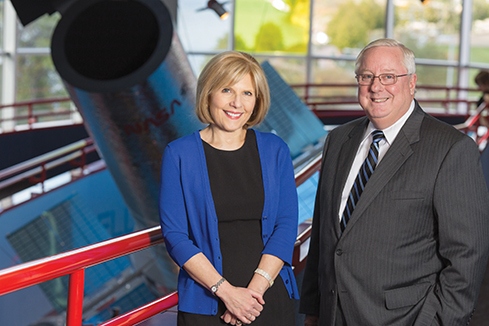 Winter 2013
Winter 2013|
“Our children will inherit both the global challenges facing energy production as well as its opportunities, so why not start engaging them now?”
|
Less than a decade ago, Carnegie Science Center reached out to its various audiences—kids, parents, educators, corporations, civic leaders— to do extensive research on what they thought should be included in our exhibits and programs. What content themes should this Pittsburgh science center include, our researchers asked, to make it a relevant and interesting place to visit? We received great feedback. Not surprisingly, we heard that astronomy and “outer space” were topics of universal interest. And robots. Pittsburgh was emerging as an internationally known center for robotics, and the public wanted a place to actually see robots. Add to that an interest in health and the human body based on the city’s strong biomedical industry and—no surprise here— the interaction of sports and science. We also learned that our audiences had an interest in water and the health of the rivers that have been the life blood of Pittsburgh. Shouldn’t a Pittsburgh science center have information on hydrology, they asked? (Well, they didn’t actually use the word hydrology, but that’s what they meant.) Perhaps the biggest surprise was a topic that didn’t make the list: energy. Nearly a decade ago our audiences simply didn’t have energy on their radar as a topic of relevance and interest for Science Center visitors. Attitudes certainly have changed. Today energy is a subject we all hear about daily. From managing regional resources like coal and natural gas, to developing new energy sources like wind and solar power, people in Pittsburgh are tuning in to this critical issue. In recent years, the Pittsburgh region has emerged as a vibrant new center for traditional as well as alternative energy production, research, and innovation. By the end of the decade, our region will see a significant increase in the number of energy-related careers. So it’s only fitting that we at Carnegie Science Center and Carnegie Museum of Natural History offer an array of educational programs to expose young people to the opportunities that await them. We know from experience that young people are particularly inspired when they get to meet real professionals working in the field. So we’ve designed our programs to include this meaningful interaction. We’ve been heartened by the willingness of those in the energy sector to participate in growing this next-generation workforce. As important and relevant as energy is to our community dialogue today, it will be even more so for the next generation. Our children will inherit both the global challenges facing energy production as well as its opportunities, so why not start engaging them now? Providing experiences that build awareness among today’s youth and involving them in discussions about energy production and consumption will better prepare them to face tomorrow’s issues. Our hope is a workforce ready to tackle these challenges will provide us with a much brighter future.
|
|||||||||
What's Your Energy IQ? · A Playful, Soulful Spectacle · Energy in Human Form · For the Love of Bugs · NewsWorthy · Face Time: Donald Warhola · Artistic License: Girl Power · Field Trip: Pop goes China · About Town: Art for All · The Big Picture
 |
Copyright © 2017 CARNEGIE Magazine. All rights reserved. |



